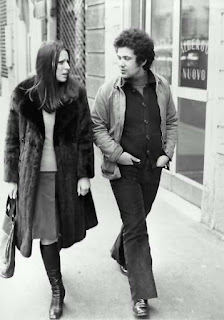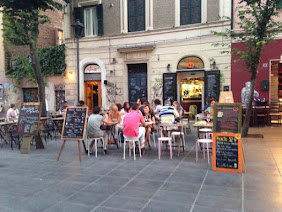Musician credited with writing ‘the soundtrack of Italian life’
Lucio Battisti, who was one of the most influential figures in Italian pop and rock music in a career spanning four decades, was born on this day in 1943 in Poggio Bustone, a hillside village in the province of Rieti in Lazio, about 100km (62 miles) northeast of Rome.
Lucio Battisti, pictured performing at the
Sanremo Music Festival in 1969
A songwriter, singer and composer, his work has been described as defining popular music in Italy in the late 1960s and the 1970s in particular, although his popularity continued right up to his death, at the age of just 55, in 1998.
Some music critics and music historians have credited Battisti with writing ‘the soundtrack of our lives’ for several generations of young people, citing songs such as Emozioni (Emotions), Acqua azzurra, acqua chiara (Blue Water, Clear Water), Il mio canto libero (My Free Song) and La canzone del sole (The Song of the Sun) as his most memorable, although there were many more that made their mark.
Of Battisti’s 18 studio albums, 13 reached number one in the Italian charts, while he had at least 10 number one singles, of which his 1971 recording Pensieri e parole (Thoughts and Words) remained in top spot for 14 weeks.
At times during his career, he was spoken of as Italy’s Bob Dylan or Italy’s David Bowie, not for the style of his music as much as the fact that he enjoyed similar status as a cultural icon. Bowie spoke of his admiration for Battisti’s work, as did Bowie’s guitarist, Mick Ronson. The two made a cover version of Il mio canto libero, which Ronson went on to include on his debut solo album, Slaughter on 10th Avenue, under the title Music is Lethal.
_in_1968.jpg) |
| Giulio Rapetti, better known as Mogol, wrote many of Battisti's lyrics |
Much of Battisti’s success stemmed from his partnership with the Italian songwriter Giulio Rapetti, better known by his pen name, Mogol. They worked together for 15 years from the mid ‘60s to the early ‘80s, during which time Mogol’s captivating, emotional lyrics combined with Battisti’s innovative music to take the Italian pop scene by storm.
The son of a customs inspector, Battisti moved with his family to Rome at the age of four, settling in Pigneto, a working class neighbourhood to the southeast of the city centre, just beyond Termini station. Having taught himself the guitar, he began to play with bands in Rome and then Naples as a teenager.
He enjoyed Naples, where he played with a group called I Mattatori, but did not earn enough to sustain himself and was forced to return to Rome. In the event, this proved fortuitous. Lead guitar with another local band, I Satiri, he found himself playing on the same bill as I Campioni, the support band to the then-famous Italian singer, Tony Dallara, who were in need of a guitarist and offered him the chance to move to Milan and work with them.
Once established in Milan, he was spotted by Christine Leroux, a French-born music producer who worked as a talent scout for the Italian label, Ricordi. It was she that introduced him to Mogol.
 |
| Battisti in Milan with his future wife, Grazia Letizia Veronese |
Not long after recording his 1974 album Anima latina (Latin Soul), the collection of songs considered to be Battisti's most complex musical offering, which remained at number one in the Italian charts for 13 weeks, Battisti became something of a recluse, declining to make public appearances or give interviews, declaring his new belief that “an artist should communicate with the public only through his work”.
His partnership with Mogol broke up in 1981, an amicable split stemming from their diversion in styles as Battisti became interested in more experimental, electronic sounds. Nonetheless, his success continued, with three more chart-topping albums, including Don Giovanni (1986), for which the poet Pasquale Panella wrote the lyrics. He also recorded some songs written by his wife, Grazia Letizia Veronese, who he had married in the late 1970s and with whom he had a son, Luca.
When Battisti died on 9 September 1998, aged only 55, the Italian music world was plunged into profound shock. It had become known in late August that he had been hospitalised in Milan, but his family respected his desire for privacy and issued no bulletins on his condition. The cause of his death was never officially confirmed, although it was thought to be the result either of a lymphoma that affected his liver, or a disease of the kidneys.
His passing was marked at a small private funeral in Molteno, the hilltop town in the beautiful Brianza area between Milan and Lake Como where he had lived since the early 1970s. There were just 20 guests, including Mogol, who had for a while occupied a neighbouring villa.
Travel tip:
Pigneto has undergone a revival recently and
now has a thriving cafe culture
Battisti’s home growing up in Rome, Piazzale Prenestina, is an area dominated by the convergence of multiple rail tracks leading to Roma Termini station and an elevated section of Rome’s orbital motorway, the Grande Raccordo Anulare. It lies at the entrance to Pigneto, an area once largely working class and industrial that has evolved in recent years into a trendy neighbourhood of alternative shops, vintage stores, and diverse bars and restaurants, popular with students. The area was badly bombed during World War II, as a consequence of which it was chosen by the director Roberto Rossellini for location shooting for his neorealist classic, Roma Città Aperta - Rome, Open City. The district was a favourite, too, of another director, Pier Paolo Pasolini.
Travel tip:
A steep staircase leads to Molteno's
Chiesa di San Giorgio
Battisti’s home in northern Italy - he also kept an apartment in Rome and a villa in Rimini - was in Molteno, a small town about 35km (22 miles) northeast of Milan, about equidistant between the lakes of Como and Lecco in Brianza, an area of natural beauty. The town itself, originally built on the site of a Roman settlement, fans out from Piazza Risorgimento, at the foot of il Ceppo - the summit of the town - from which the parish church of San Giorgio oversees the surrounding area. Battisti’s villa was at Dosso di Coroldo, a hamlet just outside Molteno. Battisti was said to be a frequent diner at Ristorante Riva in Via Roma, where he and Mogol would often meet up with other musicians, many of them famous names in Italy at the time, to enjoy the food and wine and sometimes give impromptu performances.
Also on this day:
1696: The birth of painter and printmaker Giovanni Battista Tiepolo
1827: The death of scientist Alessandro Volta
1834: The birth of soprano Marietta Piccolomini
1922: The birth of film director Pier Paolo Pasolini